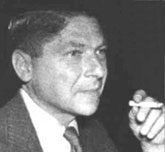Arthur Koestler
Critique • Works

Born
1905
Died
1983
Publications
Novels, journalism
Writing languages
German, English
Literature
• Darkness at Noon (1940)
Novels
• Darkness at Noon (1940)
British Literature
• Darkness at Noon (1940)
Between heaven and hell
Arthur Koestler belongs to the class of Western intellectuals in the 1900s who started off on the left, lauding the Soviet Union and supporting communist causes, only to disavow these politics in mid-century. But his journey was longer than most.
For one thing, he wasn't just applauding from afar at first but was active in the communist movement in Europe during the 1930s. For another, he ended up much further away than most, promoting spirituality and mysticism as alternatives to politics.
At the turning point between these two extremes was his most famous book, the novel Darkness at Noon (1940), which depicted the last days of a revolutionary who is imprisoned and condemned by the party he helped bring to power. Of Koestler's almost forty books published in his lifetime, only this one—and perhaps a couple of his late works on the paranormal—are much read today.
Koestler was born of Jewish parents in Budapest, Hungary, attended the University of Vienna and joined the Zionist cause. He worked in Palestine from 1926 to 1929 before being posted to Paris and Berlin where he edited and wrote for political newspapers. He joined the German Communist Party but quit in 1938, after which he edited an anti-Hitler, anti-Stalin newspaper.
While covering the Spanish Civil War he was captured by the Fascist forces. His experiences in prison, narrowly escaping death, formed the basis of his first nonfiction book Spanish Testament (1937, later abridged as Dialogue with Death) and the biographical The Scum of the Earth (1941).
His first novel was The Gladiators (1939), about the Roman slave revolt led by Spartacus. But it was his second novel, Darkness at Noon, that won him worldwide attention. It was adapted by Sidney Kingsley for a successful stage version produced on Broadway in 1951.
Quest for enlightenment
He continued to write on revolution and ideology in books such as Arrival and Departure (1943), The Yogi and the Commissar (1945), Thieves in the Night (1946), and The God That Failed (1949).
In the mid-1950s though, he dropped his concern with politics and literature. What replaced them was first a focus on science and philosophy with The Trail of the Dinosaur (1955), The Sleepwalkers (1958, later abridged as The Watershed), The Act of Creation (1964), and The Ghost in the Machine (1967). This merged with his interest in spirituality, as seen in The Lotus and the Robot (1960). Like his contemporary Aldous Huxley, who also moved from political and artistic issues toward spiritual matters, he experimented with hallucinogenics in the 1960s—though, unlike Huxley, he came out against the use of drugs in the quest for enlightenment.
His later publications dealt with his longtime psychic interests. The Roots of Coincidence (1972) sought scientific support for extrasensory perception and was one of the books to usher in the New Age of mysticism. The Challenge of Change (1973) related his studies of coincidence to Jung's idea of synchronicity.
Racked with Parkinson's disease and leukemia, he committed suicide with his wife in 1983. He left his entire estate to establish a chair of parapsychology at Edinburgh University.
In more recent years, Koestler has been a controversial figure for reasons other than political or spiritual. A biography, Arthur Koestler: The Homeless Mind (1998) by David Cesarani, paints a dark picture of Koestler as a controlling, bullying character—which, to be truthful, may be said of many of our great writers—but also charged he may have been a serial rapist. These charges were supported by another British writer who claimed to have been one of his victims. Others acquaintances disputed the allegations, accepting only that Koestler's relations with women were misogynist or aggressive.
— Eric
Critique • Works

